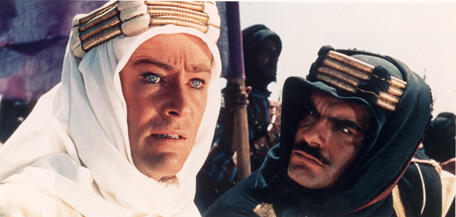|
|
Classic Movie Review: Lawrence of ArabiaBy Clint ChirpichJuly 6, 2016
Cutting immediately from the funeral, we're thrown back in time 20 years to Egypt during World War I, where Lawrence is a young, brash, and intelligent officer with the British army. Due to his experience with Arab culture, he is given an assignment to find Prince Faisal (Alec Guinness) and assess his troops in their revolt against the Turks. Perhaps the most famous image from Lawrence of Arabia is found early on in the film - the iconic "match" cut which transports the viewer from inside a small room on the Army base to the vast desert. I had seen the cut several times in various retrospectives on television or online, but seeing it on the big screen was a sight to behold. It doesn't take Lawrence long to endear himself to the prince, and soon he's leading a daring expedition across the blistering Nefud Desert to launch a surprise attack against the important port city of Aqaba. Accompanying him are 50 of the Prince's soldiers, led by Sherif Ali (Omar Sharif) who is wary of the pasty-skinned Englishman. The rest of the film is a series of battles - both physical and political - with Lawrence undergoing some serious character changes. Even though the film is more than 50 years old, I have no intention of spoiling anything. Film is often called a "director's medium," and if you ever need an example of what a director can accomplish, look no further than Lawrence of Arabia. Right from the start, with that exciting motorcycle race, the film shows how talented and detail-oriented David Lean was. Each scene, each camera setup, and each frame was meticulously planned and executed. Lean was known to be a bit of a taskmaster on his sets and would require take after take until he got exactly what he wanted. Like with some of my favorite directors - I'm thinking specifically of Stanley Kubrick and David Fincher - you can't argue with the results. They may be difficult to work with and the cast and crew may end up exhausted, but the final product speaks for itself. Lawrence of Arabia is a beautiful, exciting, well developed, and emotional film with wonderful performances throughout. It is one of the best epic films I've seen and a lot of the credit can and should go to Lean, who won the Academy Award for Best Director for his efforts - his second, after winning previously for The Bridge on the River Kwai.
[ View other Classic Movie Reviews ]
[ View other articles by Clint Chirpich ]
[ Email this column ]
|

|
|
|

|
Friday, November 1, 2024
© 2024 Box Office Prophets, a division of One Of Us, Inc.


